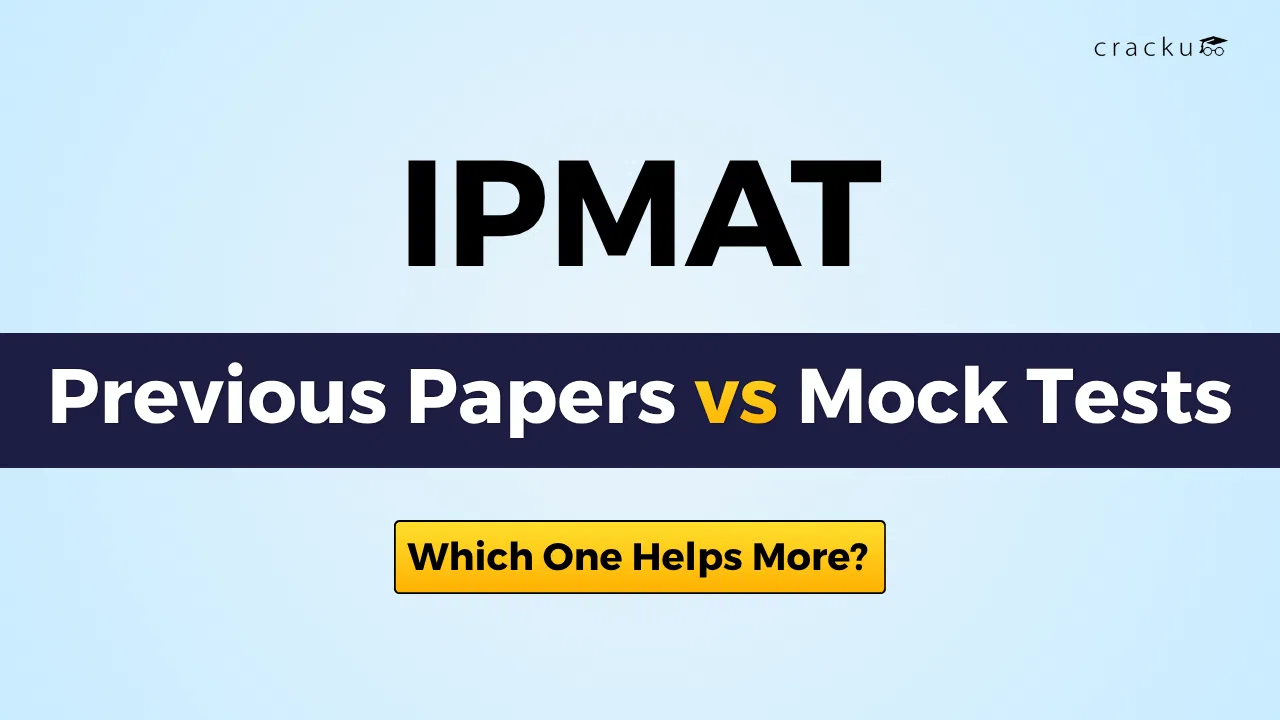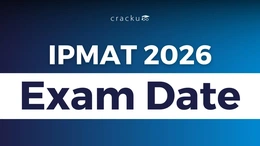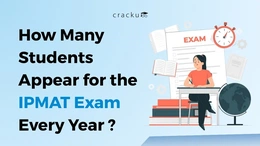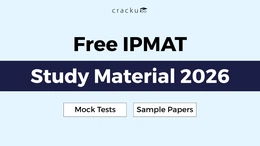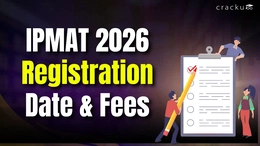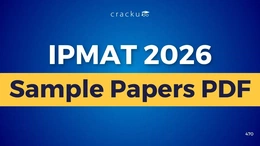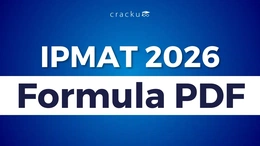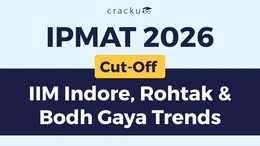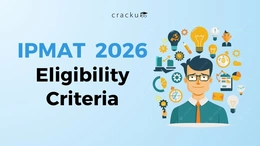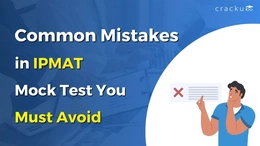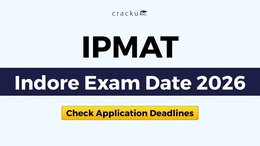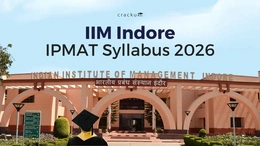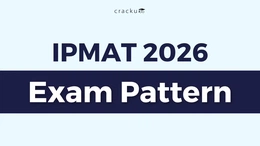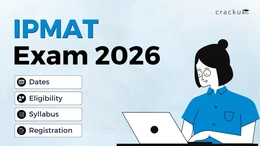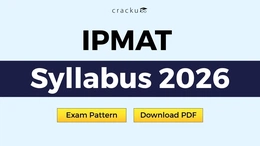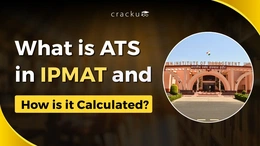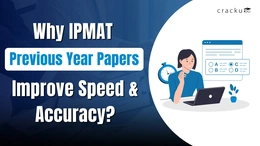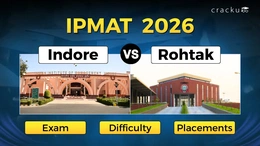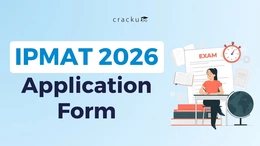IPMAT Mock Tests vs Previous Papers
Aspirants often face a key question. IPMAT Mock Tests vs Previous Year Papers: Which Helps More? The answer is not one or the other. Both tools are vital, but they serve different purposes.
Previous Year Papers (PYQs) are the blueprint. They show you what the exam is. Mock tests are the simulation. They show you how to handle the exam. Using only one is a common mistake.
IPMAT Mock Tests
An IPMAT Mock Tests is a full-length, simulated practice exam designed to mirror the actual test environment. It is a rehearsal for the final exam.
These tests are not only question banks. They are strategic tools created by coaching experts. They reflect the latest exam patterns, difficulty levels, and the all-important time constraints. The main goal is to put you under realistic pressure.
- Key Purpose: Create the real exam environment.
- Primary Benefit: Discovering what your strengths and weaknesses are in a timed setting.
- Strategic Value: Creating the mental stamina to remain on task for the entire 120 minutes.
IPMAT Previous Year Papers
IPMAT previous year papers (PYQs) are the official, authentic question papers from past exams. They are not a simulation. They are a historical record.
This makes them the single most reliable resource available. This is vital for an exam like IPMAT Indore, which famously does not release a detailed syllabus. PYQs are the exam's DNA. They demonstrate what exactly are the prioritized topics and expose the way that questions are actually asked.
- Key Purpose: Getting knowledge about the real exam pattern and questions.
- Primary Benefit: Identifying topics of high weightage, which occur repeatedly.
- Identify your strengths and weaknesses by solving actual exam questions.
Also Read, Free IPMAT Study Material 2026, Mock Tests, Sample Papers
Why Solving IPMAT Mock Tests is Crucial for 2026
Solving IPMAT mock tests is crucial for 2025 because it is the only way to master exam-day strategy and time management. PYQs show you the past. Mocks prepare you for the future. The 2025 paper could have new patterns or a different difficulty. Mocks are designed to prepare you for this uncertainty.
The most critical feature of the IIM Indore exam is its rigid sectional timing: 40 minutes per section. You cannot master this pacing by just solving questions from a book. Mocks build this muscle memory.
But the real work begins after the test. Analysis is everything. Taking a mock and just checking the score is useless. You must understand why you made each mistake. Was it a concept gap? A careless error? Or did you run out of time?
- Mastering Time Management: Mocks teach you how to allocate this time perfectly. In Cracku’s IPMAT Mock Tests you can check the proper analysis of every single question which include accuracy, time taken, time taken by toppers etc.
- Developing Strategy: Mocks teach you the most valuable exam skill: What questions to skip. This is essential to avoiding negative marking and getting the most out of your score.
- Performance Analysis: Mocks are diagnostic tools. They give you data on your weak areas. This helps you focus your study time where it is needed most.
- Building Resilience: High-quality mocks will vary in difficulty. This trains you to stay calm and perform, even if the 2025 paper is much harder than you expected.
Also Read, IPMAT Syllabus 2026, Indore & Rohtak Pattern, Topics, and PDF
Benefits of Solving IPMAT Previous Year Papers
The primary benefit of solving IPMAT previous year papers is gaining a clear, data-driven insight into the exam's core priorities. This is your foundation. Data shows that a high percentage of students who crack the exam practice PYQs extensively.
PYQs help you build an intelligent study plan. You can focus on high-yield topics. You can ignore things that rarely appear. Analysis of PYQs reveals that the Quantitative Ability section consistently features a high number of questions from Algebra, Arithmetic, and Geometry. This allows you to prioritize.
- Identify High-Weightage Topics: PYQs show you exactly which topics appear every year.
- Set a Realistic Baseline: Taking a recent PYQ under timed conditions is the best thing one can do during the preparation. It gives you an unbiased baseline score to track your progress.
- Understand Question: You get to know the style of questions that RC passages, grammar questions, and DI sets are preferred in the IPMAT.
- Know your Cutoffs: You can compare against real data to compare your score. For the IPMAT Indore 2024 exam, the cutoff for Verbal Ability in the General category was 113 (out of 180). The cutoff for the QA (MCQ) section was a mere 35 (out of 120). This data tells you that it's critical to master the Verbal Ability section.
Also Read, IPMAT Formula PDF, Download Quant Formula Sheet PDF
Mock Tests vs PYQs: Which is Better for IPMAT 2026?
For an IPMAT 2026 aspirant, the answer is clear: PYQs are better for starting, and mocks are better for finishing. The debate IPMAT Mock Tests vs Previous Year Papers: Which Helps More? is a false choice. The two tools are sequential, and with two years, you have time to use them perfectly.
Your preparation should be split into distinct phases. In the beginning, you are learning concepts. In the end, you are mastering strategy. PYQs are for the first phase. Mocks are for the second.
A smart IPMAT 2026 strategy looks like this:
- Phase 1: Foundation (First 12-18 Months). Use PYQs as a learning tool. After you study a concept, immediately solve all related questions from the last 5 years of PYQs. This builds a rock-solid foundation.
- Phase 2: Strategy (Final 6-9 Months). Begin taking full length mock tests once you are done with at least 70% of the syllabus. Start with one mock for every 10-14 days. This is where you shift from learning to performing.
- The Hybrid Loop (Final 3 Months). In the last stretch, use both. Take a mock test to diagnose your weaknesses. Then, use topic-wise PYQs and study material to fix those specific weak areas. Test. Analyze. Fix. Repeat.
IPMAT Mock Tests vs Previous Year Papers: Conclusion
Both IPMAT mock tests and previous year papers are indispensable tools in an aspirant's preparation journey. The key to success lies in knowing how to use each tool effectively at the right stage of preparation. While previous year papers are excellent for building foundational knowledge and understanding the core exam patterns, mock tests focus on sharpening your exam strategy, time management, and mental resilience. A balanced combination of both will ensure that you are well-equipped to tackle the IPMAT 2026.
